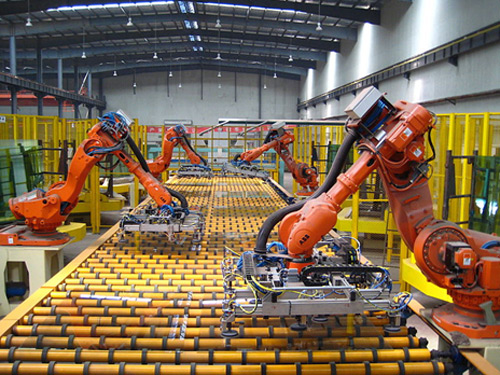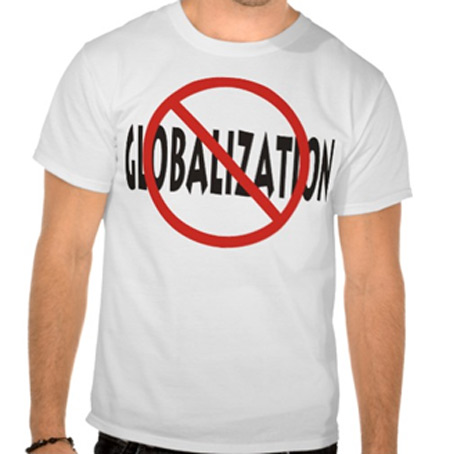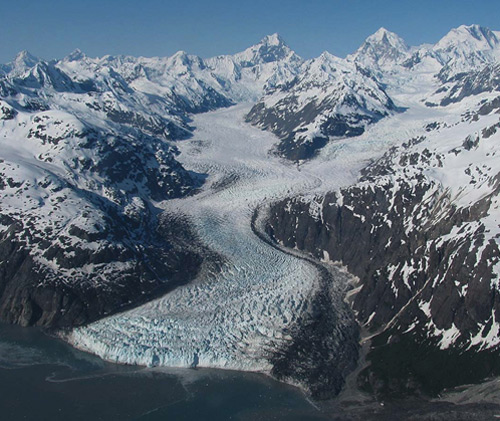
By Patrick Watson*
The US-China trade war dominates the economic news, but in the long run, tariffs may be a minor detail.
The global economy works like a glacier, those giant rivers of ice that slowly slide downhill until they melt. Most move only a few feet a day, but you can’t stop them. Given enough time, a glacier will crush whatever is in the way.
Likewise, politicians can’t stop the economy from eventually doing what it wants. At most, they can nudge it a little bit.
President Trump wants the United States to manufacture its own goods instead of importing them. This is already happening in a trend that started before he took office and will continue long after he’s gone.
But not quite the way he thinks.

Photo: Wikimedia Commons.
Global rules
One giant macro force drove economic change over the last 50–60 years: globalization. National economies that had once stood alone began integrating. Goods, services, people, and capital flowed across international borders more freely.
On balance, this was positive. Everyone is better off when they are free to do what they do best. But the way it happened created winners and losers—and our present political angst.
One reason for this is that businesses used globalization to save on wages. They moved labor-intensive production to low-wage countries, then shipped the goods back to where the consumers lived.
In other words, globalization thrived by exploiting wage differentials. Now those wage differentials are narrowing, and guess what: globalization isn’t working as well. This will continue and accelerate. We’re seeing the results already.

Photo: Wikimedia Commons.
Crushed politics
If wages were the same everywhere, manufacturers would set up production facilities near their customers to reduce shipping costs and deliver the goods faster.
That is now becoming a reality, but not because we’re nearing wage equality, but because much of the labor is no longer human.
Factory robots are a big investment—but once in place, they work at the same speed, at roughly the same cost, no matter where you put them.
That means an automated factory in Indonesia producing goods for US consumers now has a much smaller advantage over a similar factory producing the same goods in Kansas. The robotic labor costs the same in both places.
And when you consider that the Kansas factory can deliver a month faster and the owners don’t have to finance inventory in transit, the incentive to move production to the US is even greater.
The Wall Street Journal reported last week that “More Factories Crop Up Closer to Customers.” It named several companies—like window manufacturer Andersen and Italian tissue-paper maker Sofidel - that are trying to shorten the distance between production and consumers. I think more will do so.
Other technologies, like 3-D printing and renewable energy, reinforce this trend. Tariffs matter in the short run. Over time, though, technology is a glacier that will crush both protectionism and globalization.

Photo: National Park Service via Flickr.
Time to adapt
All this means we are right now at a major economic turning point.
We spent the last half-century or so making national borders more porous and bringing economies together. Now that process is reversing.
I think future historians will say the 2008–2009 crisis marked “Peak Globalization.” The next phase will take us down the other side of the mountain.
This will take years to unfold. We’ll see some reversals along the way, but the major trend is clear. Borders and barriers are going back up. Businesses and consumers will have to adapt.
This will have some important consequences that may matter to your investments.
- For instance, as manufacturing moves closer to consumers, there will be less need for those giant container ships and all the infrastructure to service them.
But localized manufacturing will still need raw materials, which may have to travel from afar. So cargo shipping won’t disappear completely.
- Energy will have a similar change. Solar, wind, and other renewable sources will keep getting more cost effective - and they don’t need constant fuel deliveries.
That means fewer oil tankers crossing the sea and less capital tied up financing in-transit oil inventory… not to mention big geopolitical and defense-spending changes when OPEC countries no longer have an energy stranglehold on the rest of the world.
- As factory automation improves and moves closer to consumers, we’ll increasingly make products on demand instead of keeping vast quantities on store shelves and in warehouses. That will affect real estate and construction.
The theoretical end point is something like the Star Trek replicator in your home. You tell the machine what you want and poof, there it is. No shipping, no stores, and no waiting. You get what you want, when you want it.
That’s science fiction (for now), but it describes the direction we are going. Like the unfortunate Donner Party, some of us may get stuck in mountain passes before we arrive. Let’s hope we won’t resort to eating each other.
Nevertheless, there is no going back. Forward is the only choice.
*Patrick Watson is senior economic analyst at Mauldin Economics. This article is from a regular Mauldin Economics series called Connecting the Dots. It first appeared here and is used by interest.co.nz with permission.
23 Comments
Good on Interest.co for having the cohones to present this.
And considering that 'robot' can mean a Raspberry Pi Zero W, local cost $30, the size and weight of a credit card, controlling a whole bunch of mechanical stuff from Web instructions, it all rather puts the notion of 'sustainability' on a different plane.
Unfortunately we can't, because localising production will reduce global CO2 emissions and we are signatories to the Paris Accords.
The Paris Accords on Climate Change prevent signatory countries from localising production without incurring significant penalties due to increased local emissions. Meanwhile global transshipment, which creates more carbon emissions than localised production, is exempt from Paris Accords. The resulting increase in total emissions accelerates climate change and facilitates more stringent enforcement of local caps. Which further accelerates climate change.
A good thought provoking article.
The premise used is that producers want to be close to their market which is assumed to be non-global i.e. in a specific country.
However, that market is most likely to become increasingly more global. A couple of examples:
The market for luxury cars - which is already heavily automated that is one of the article's preconditions - has traditionally been North America and Europe but that is increasingly including population dense Asia. This will be especially more-so as developing nations become more affluent.
The influence of communication technology - and in particular on-line shopping - has resulted in a global markets and therefore location of production close to the market becomes irrelevant.
While we have already previously witnessed a shift of producers wanting to be close to their market - such as New Zealand producers moving to Auckland - this is not necessarily going to be the future. Due to costs of land and infrastructure issues, and improved communication, there is already a trend of some producers moving back to the provinces away from their dominant market as other costs out weigh that advantage. Close to market may not be either the sole or most important consideration as is assumed.
I am afraid that globalization is a one way street and there is no going back.
I've seen it pointed out that the last time the world was so globalised was the lead up to World War 1.
It says that history repeats itself, but not in a complete way.
There are so many metrics that I can quote to show that the world is becoming a village.
But I love this one very much --
the number outbound visitors as a percent of total world population in 1900s vs 2017.
Xingmowang Aucklanders know you are right
The village of Auckland my late father called it
Closed on weekends
Look at it today
Even the Asian tourists note there’s a lack of kiwi faces they expected in downtown Auckland
The migration around the world continues
Oh,
your definition of Kiwi must be exclusively being white Europeans?
Your definition of China is exclusively being yellow Asians. A white person could never be Chinese - but we're expecting to be give the keys to our identity to everyone, while being locked out of yours.
you clearly do not know that there are 55 minority ethnic groups in China and their skin color ranges from black to white.
Almost all those groups are different kinds of Asian.
How many non Han Chinese are there in the central committee of the communist party? In NZ there are people of all different races represented in Parliament.
I note that - according to official statistics - 0.0001% of Chinese people are naturalised citizens. Maybe China needs diversity. I am sure you'd feel absolutely fine if all Tier 1 cities were 10% Indian.
50 shades of yellow?
Like those Muslim minorities the Chinese govt are keeping in re-education camps? Clearly the CCP don't think multiculturalism makes their empire stronger. It's an ethno-state and that's how they want to keep it.
Yes war like giant debt & incompetence are all human failings
Our greatest achievement will probably be our commencement of artificial intelligence which will machine learn
itself far and away in excess of all human intelligence
I don’t think enough people generally understand the significance of machine learning
Take a look around because we are at the edge of great change and life will never return to what it is today
Of course by all means discuss rental housing & rapid transit but everyone should study what is looming ahead
By the way Foxcon China has ordered even more robots This was from 2016 https://www.bbc.com/news/technology-36376966
These are not the artificial intelligence I’m speaking of but check out Boston Toronto Ai both cities are leading research
Explain why the shipping industry is introducing the most massive container ships ever IF globalization is in decline ?
Our local ports are extending & dredging channels to make way for them
Globalization is good and it will grow
I think they may have misjudged the future, just me having a guess.
Goodnight kiwis
Great article
Great blog
Very pertinent and enjoyable article, thank you Patrick Watson.
Throughout history we have always underestimated the impact of tech evolution. But also... those who do try to imagine what the world will look like with even more advanced tech also tend to underestimate mankind's adaptability, we evolve our behaviour around the new tech. Technology if anything, is our defining feature as a species (that and communication), we grow, adapt and eventually even biologically evolve around it.
Has any global generation had more in common than the millennial generation? If it is a country where the young people have grown up with uncensored access to the internet, smart phones etc they could live in Zimbabwe, Iceland or USA and they communicate like they are one tribe. I frequent all the usual online spaces (reddit, 4chan, quora, FB, twitter etc) and am always amazed at the diversity of geography but universality of values, humour and understanding between this generation. Sometimes I think that the global millennial generation have more in common with each other, than they do with the older generations of their nation of origin. Whatever it is, that I am observing, it's almost certainly to do with their use of technology.
Have you found an online space that spans generations as well as geography?
Isis evolved and grew online but has values most of us strenuously reject. Are there fences within your online spaces? Like talking to like.
There are always exceptions and fringes within any culture or generation Lapun, i'm surprised that would need to be mentioned explicitly.
Whilst online radicalisation has undoubtedly occurred, it is statistically insignificant within the context of the entire millennial generation. I understand that it looms large in the collective consciousness because of the dramatic affect just a small number of terrorists can have, but to suggest that ISIS online presence is anything but the tiniest of tiny fringes of online culture would be a distortion.
I'm not sure about fences, but generally, fringe groups tend to get banned from the main online spaces and eventually end up creating their own tiny spaces online to inhabit or go entirely underground. The INCEL community is a good example of this. I have come across INCEL online but never ever anyone sympathising with ISIS. I assume they are pretty far underground and I certainly couldn't comment on anyone expressing their values online. There are certainly fences I would say. For instance, reddit has subreddits, where individual spaces are created for niche topics or interests but they are not walls, because everyone can interact and read what is happening in those spaces (much like you can over your neighbours fence) and those groups can and do interact. The values, humour and communications are happening publicly and therefore influence each other.
I understand what you are saying but remain a trifle skeptical. Among english speakers you might be broadly correct. However values have changed during my lifetime - from homosexuality being illegal and severely despised to being mainstream - nothing wrong with a value changing and I was going to say for the better but by definition everyone says that - they must have done so when the idea of burning witches became popular. So at a guess most Pakistanis disapprove of homosexuality - if you are right they are just lagging behind fashion but I suspect there will be no significant change. I have no intention of appearing anti-Islam so note the same split in values for Anglicans from Africa and Anglicans from UK & USA.
Not quite sure what you mean by 'communications' but if it includes music then for both humour and communications we are less global than we were in the 1920s. Silent movies made Chaplin and Keaton popular from Siberia to New Guinea to China; it was talkies that reduced global humour. And Louis Armstrong changed music worldwide to a greater extent than any subsequent performer. Jazz bands formed everywhere in homage to Armstrong and Ellington; there has not been any revolution in music as influential as twenties jazz.
The generational differences in my family are probably echoed thoughout the internet. Assuming only one example will make my point - elderly people are sensitive to being treated as valueless but teenagers act as if they are. So I can communicate instantly with my sisters who live on the other side of the world but have more difficulty communicating with my 10 year old grandson who lives next door.

We welcome your comments below. If you are not already registered, please register to comment
Remember we welcome robust, respectful and insightful debate. We don't welcome abusive or defamatory comments and will de-register those repeatedly making such comments. Our current comment policy is here.